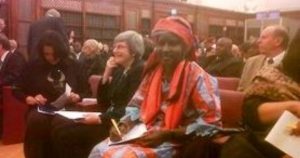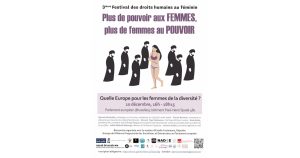On 10 December 2012, during a ceremony held at the Italian Senate in Rome in parallel with the Annual Forum of Parliamentarians for Global Action, Ms. Khady Koita, a Senegalese activist and President of the NGO La PALABRE, was granted the Defender of Democracy Award (DDA) for her commitment to women’s rights and advocacy for a worldwide ban on female genital mutilation as a human rights violation.
Since 1996, this Award is presented to individuals who, through their own commitment and active engagement, have made significant progress in strengthening democracy and democratic practices. Past recipients include Hon. Helen Clark, Former Prime Minister of New Zealand; Ms. Mary Robinson, former United Nations High Commissioner for Human Rights; and Mr. Lakhdar Brahimi, former Special Representative of the UN Secretary-General for Afghanistan.
The 2012 DDA Prize awarded to Khady Koita is without doubts an authoritative and prestigious acknowledgement of years of advocacy efforts to bring worldwide attention to the issue of female genital mutilation (FGM), spearheaded by an ever-expanding Ban FGM Coalition, composed of La Palabre, No Peace Without Justice (NPWJ), the Inter-African Committee on Traditional Practices Affecting the Health of Women and Children (IAC), Euronet-FGM, and the NGOs Manifesto 99 and Equality Now.

The international campaign led by the Ban FGM Coalition has seen a landmark step with the adoption, on 26 November 2012, by the Humanitarian Cultural Affairs Committee (commonly referred to as the Third Committee) of the United Nations General Assembly (UNGA) of the draft resolution “Intensifying Global Efforts for the elimination of female genital mutilation”. Notably, the draft resolution urges States to “condemn all harmful practices that affect women and girls, in particular female genital mutilations, and to take all necessary measures, including enacting and enforcing legislation to prohibit female genital mutilations and to protect women and girls from this forms of violence, and to end impunity”.
NPWJ and its partners look forward to the adoption of this pivotal instrument by the United Nations General Assembly, in December this year, which would demonstrate the strong commitment of the international community to support the actions of those Member States and activists which have been at the forefront of the battle to challenge and put an end to this human rights violation both nationally and, increasingly, internationally.
Ban FGM Campaign
Over the past years, the members of the Ban FGM Coalition have collaborated on several initiatives to raise awareness internationally about the need for a UNGA Resolution banning this human rights violation, gathering the support of human rights activists, women’s organizations, parliamentarians and government representatives from throughout Africa and Europe.
Tangible momentum towards a Resolution has been gathering speed over this past year. A key step in the process was the July 2011 AU Assembly Decision by the Heads of State and Government of the African Union in support of a Resolution by the General Assembly.
The African Group at the UN took action to implement the will of the Heads of State by introducing a CSW Decision at the Session of the UN Commission on the Status of Women (CSW) in March 2012, recommending that the issue of FGM, until now discussed only within the context of the CSW, be formally considered by the General Assembly under the agenda item “Advancement of Women”. In July 2012, the ECOSOC adopted the CSW recommendation and requested that the issue of female genital mutilation be added to the agenda of the 67th General Assembly.
For more information, contact Alvilda Jablonko, Coordinator of the FGM Program, on ajablonko@npwj.org / phone: +32 494 533 915 or Nicola Giovannini on ngiovannini@npwj.org or +32 (0)2 548-39 15.



